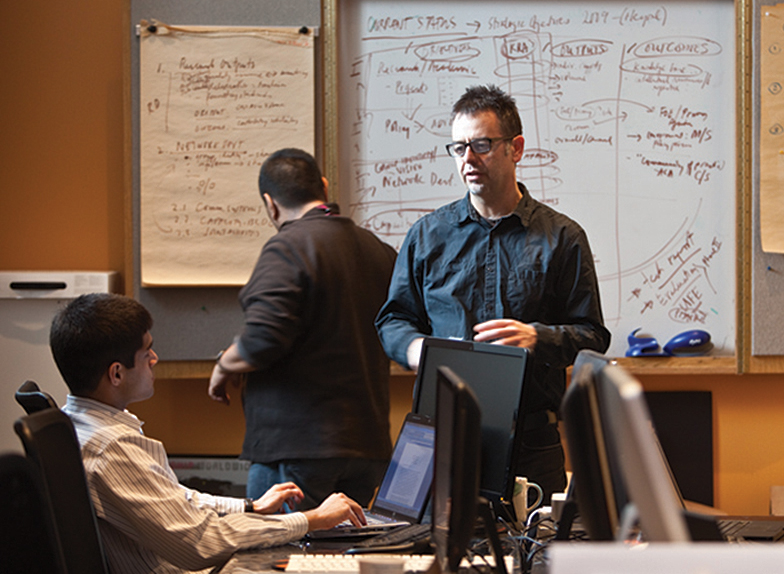History unfolded on a broad thoroughfare in Tehran on an overcast day in June. At one end of the boulevard hundreds, perhaps thousands, of Iranians, had gathered. Many of the protesters appeared to be young men in jeans and T-shirts. There were a few women too, wearing black head scarves and flashes of green – the now familiar colour of defiance. Facing them was a phalanx of baton-wielding riot police, indistinguishable in their beige camouflage gear and black helmets.
In tennis-like volleys of epithets and rocks, the confrontation pitted instruments of state power against citizens angry over the outcome of a disputed presidential election. The riot police repeatedly edged toward the protesters but were beaten back until, in a spasm of energy and will, the demonstrators surged forward, forcing their adversaries to retreat for good. Finally, a roar went up, signalling the protesters’ hard-fought triumph. (The dramatic scene was captured on a bystander’s camcorder and immortalized after being uploaded on YouTube.)
While clashes like this were being routinely played out in Iran’s turbulent cities this past summer, there was a more subtle, but no less fierce, duel being waged in the electronic ether between Tehran and the mostly youthful protesters. In this virtual arena, both sides fought for control – not of restive streets but of the flow of images and information. In cyberspace, computer filters, not batons, are an intransigent regime’s weapon of choice to choke off Internet access – and the aim is to root out and silence dissenters, not bash heads. For those who challenge authority on the web, this contest requires stealth, imagination, computer literacy and, perhaps most vitally, resolve and courage.
This was certainly true in Iran, where the cleric-led government had barred most reporters from recording and showing the world the violent and bloody aftermath of the contentious election. The country’s bombastic president, Mahmoud Ahamadinejad, declared the June 12 vote the “freest” and “healthiest” in the world. The demonstrators denounced the election as neither free nor fair, but rigged. To voice and fuel their resistance, countless Iranians turned to YouTube and social networking tools such as Facebook and the microblogging site Twitter.
The protesters had a Canadian ally in their technological corner. Propelled by an anti-authoritarian streak, University of Toronto professor and cyber-guru Ron Deibert has spent years combating online surveillance, repression and censorship.
The 44-year-old widowed father of four is, not surprisingly, insanely busy. Most days, Deibert can be found in the funky subterranean offices of the Citizen Lab at the Munk Centre for International Studies, peering with laser-beam intensity at his grey laptop.
Born of Deibert’s restless imagination in 2001, the Citizen Lab is now the epicentre of the political scientist’s network of more than 100 cyber-sleuths in 70 countries who map, monitor and test access to thousands of websites. Deibert is the lab’s director, but he is also mentor, teacher and conductor of this eclectic hothouse of political science, sociology, computer science, engineering and graphic design students, and field investigators. All of them share his mission: to tip the scales of power in cyberspace in favour of ordinary citizens.
“I’m a classic liberal,” says Deibert, a punk-rock buff who sports a salt-and-pepper goatee and a thick crop of dishevelled black hair. “I don’t like the power of the state looming over me.” A one-time grocery store clerk who mopped floors and stocked shelves on the graveyard shift, Deibert has emerged as a headline-grabbing leader of a burgeoning global movement that champions free speech and human rights in the electronic frontier.
Deibert was in Penang, Malaysia, when Iran’s streets erupted. He was there to meet researchers and field investigators from 11 Asian countries affiliated with the worldwide OpenNet Initiative. The initiative is one of Deibert’s many collaborative research and business ventures, set up to monitor, analyze and, in several high-profile instances, thwart efforts by governments and other players to deny Internet access, spy on their citizens and wage cyber-war on political, ideological and military foes.
The web wasn’t supposed to turn out this way. The Internet’s commercial genesis a little more than a decade ago was an epochal technological moment. The thinking and hope – expressed in “cyber-libertarian” John Perry Barlow’s Declaration of the Independence of Cyberspace – was that repressive regimes would fall victim to the Internet’s inherent democratic impulse. Increasingly, this notion seems fanciful. A mushrooming list of largely authoritarian governments of various political and ideological pedigrees is asserting control over the web – occasionally in the name of the so-called war on terror – with software, search engines and hardware built in large measure by North American firms. “The myth,” Deibert says, “was that authoritarian regimes would wither in the face of the Internet. In fact, in some respects, it has given them the means to engage in greater levels of control over their populations.”
That point was confirmed again when Deibert and his longtime business partner and Citizen Lab colleague, Rafal Rohozinski, unveiled an alarming report in Malaysia on an insidious Chinese software program. Called Green Dam, the program was designed to censor and filter the Internet on every new computer in China. (Green Dam was designed in part with pilfered American software, Deibert says.) But the meticulous report, completed with colleagues at Harvard University, was suddenly overwhelmed by the tumult in Iran.
As news of the Iranian protests hit, Deibert mobilized researchers, engineers and technical wizards in Canada and Britain, as well as trusted contacts inside Tehran, into a “virtual” base camp. They quickly established what he calls “right2know” nodes to “push” a slew of websites into Iran, thus enabling Internet users there to access previously banned sites, including Voice of America, Balatarin (an Iranian news site), Human Rights Watch and Flickr.
In fact, the complex and encrypted software behind the right2know nodes that Deibert’s team engineered is the only firewall-penetrating tool that allows users to access websites through their mobile phones and that is compatible with streaming video sites.
The work paid dividends. By Deibert’s count, more than 18,000 Iranians signed up for the free service at the height of the crisis in late June. Some of the videos that the Iranian government tried to bar the world from watching – of street confrontations, and bloodied and dead protesters – were, in all likelihood, uploaded onto YouTube using the right2know nodes and an iPhone.
Coincidentally, Deibert was already involved in a pilot project with the BBC: the British broadcaster used a revolutionary content-delivery service, called Psiphon, to bypass Iranian filters. Psiphon allowed people in Iran to gain Internet access to the BBC’s Persian service and other banned websites – including Radio Farda, a U.S. government–funded station that broadcasts into Iran – and online social networking tools.
Created in 2006, Psiphon was the brainchild of the Citizen Lab. Deibert and his partners have since turned the service into a Canadian-based company called Psiphon Inc. A portion of the firm’s profits is funnelled back into a slew of research initiatives. They need every penny. Despite the mismatch in size and resources, Deibert and his crew are trying to keep pace as governments design and deploy more sophisticated means of blocking Internet access. They’re working, for example, on a faster, smarter, more reliable edition of Psiphon. In part, that has required them to capture all banned content – except, of course, pornographic websites – on servers so that the prohibited content will be conveniently and instantly available to Internet users everywhere. The updated version of Psiphon will, in effect, be a one-stop-shopping portal for all banned websites around the world. Deibert’s band of ingenious engineers is also devising ways to intercept state-launched “blockers” and shunt them into an electronic dustbin before they can infect or disable Psiphon.
Deibert knows that his work involves risk, not so much for him but for Internet users and his field investigators, who face retribution for defying or probing government-erected firewalls and bans. Indeed, one of Deibert’s associates in Uzbekistan was detained and questioned by secret police immediately after leaving an Internet café where she had been checking a website suspected of being filtered by the government. “When you push back at authority, they are going to push back with the pointy edge of the stick,” Deibert says. “So a lot of people suffer the consequences. It’s usually the brave ones who go out onto the street, not the ones who sit in their air-conditioned offices in Toronto.”
That’s why Deibert takes steps to prevent users of filter-avoiding software from getting caught. The Citizen Lab has put together and posted a detailed guide, translated into a variety of languages, explaining the risks of using Psiphon and filter-busting technology. “We are very conscious of security,” Deibert says. “But if no one took risks, we would all be living in the Middle Ages, still [under] some canonical authority.”
Predictably, Deibert’s efforts earned the wrath of the Iranian government. Tehran charged that London, and in particular the BBC, was fomenting the unrest. Later, Canada’s chargé d’affaires in Iran, Michel de Salaberry, was reprimanded by Iranian officials for Ottawa’s phantom role in “destabilizing” the regime by supporting the availability of Twitter and Facebook in Iran.
“If they are calling in the Canadian envoy, it’s got to do with us,” Deibert says. Canada’s man in Tehran, Deibert adds, must have been puzzled by the diplomatic slap on the wrist since Stephen Harper’s Conservative government played no role in keeping the information superhighway into Iran partly open.
That wasn’t the first time Deibert has felt the weight of powerful governments. Several months earlier, Deibert and his fellow cyber-detectives, Rohozinski, Greg Walton and Nart Villeneuve, made headlines with their discovery of a pervasive computer espionage network – they dubbed it GhostNet – that had compromised more than 1,300 computers. Included were computers at the Dalai Lama’s offices in Dharamsala, India, as well as those at diplomatic missions, media outlets and a variety of international organizations across the globe.
Who precisely was doing the snooping remains a mystery. But Deibert’s investigators discovered that the still anonymous hackers, connected to servers in China, assumed control of the infected computers. Beijing was not amused at the accusations (promoted by the media) that it was behind the espionage operation and promptly dismissed them as “rumours” and “lies.” But that wasn’t the end of the story. According to Deibert, Chinese consular officials in Toronto were so incensed by the report’s findings that they “blasted” two senior Munk Centre officials at a tense lunch meeting in June.
Deibert is nonplussed by the Iranian and Chinese criticism. “We’re just an annoying little fly.”
But the “little fly’s” work on GhostNet in particular – concerned as it was with a prominent spiritual leader, intrigue and espionage – attracted a deluge of media attention. Apparently the controversy and exposure GhostNet triggered also prompted the issue of cyber-espionage to be put on the agenda in Washington and London. In the weeks following the GhostNet revelations, U.S. President Barack Obama and British Prime Minister Gordon Brown separately announced plans to create civilian agencies, led by so-called “cyber-czars,” to defend their nations’ vast computerized infrastructure against hackers and terrorists.
However, in making his announcement, Prime Minister Brown acknowledged that his government has the ability to launch offensive cyber-attacks. President Obama made public plans to establish a new military command for cyberspace to step up preparations by his armed forces to wage war in the electronic battlefield.
The pronouncements confirmed Deibert’s long-standing fears about the militarization of cyberspace. Canada, he believes, should seize the opportunity and play its traditional diplomatic role of honest broker to help fashion an arms control agreement for the Internet. (For his part, Deibert has openly discussed his work and views on the weaponization of cyberspace with American, Russian and British military and intelligence officials. “In order to effect change,” he says, “you have to have a conversation with them.”)
Playing such a role would require a volte-face on Ottawa’s part: to date, the Canadian government has taken little, if any, interest in Deibert’s research, not to mention the broader issues of Internet censorship and denial of access. (Last April, Ottawa belatedly announced that it was working on “an overall cyber-security strategy.”)
Nevertheless, Deibert says, “Canada can be a powerful advocate and a force for transparency and accessibility in cyberspace. It can and should work toward ensuring that cyberspace is an open commons for the world.”
To do this, he says, Canada needs to be ambitious.
First, Ottawa must convene a meeting of “major powers” to craft a “Treaty of Cyberspace” that ratifies a foundational precept: Internet security is a global imperative; cyberspace must be protected and preserved for all.
To monitor and enforce that defining principle, Canada should advocate for an international authority that would set global protocols to deal with cyber-crime and espionage, as well as with denial of service attacks and viruses.
Finally, the nation’s foreign policy decision-makers need to recognize that, if enacted, these proposals could be a powerful and persuasive vehicle to project core Canadian values to the world. In the meantime, Ottawa, Deibert insists, should invest human resources and money into Internet technologies that promote free speech, privacy and access to information at home and abroad. “It’s about trying to help others and make the world a better place,” he says.
A chorus of voices inside and outside government will likely dismiss Deibert’s bold prescriptions as naive and utopian. He has little time or patience for the naysayers. True to his nature, Deibert will be too busy – hunched over his laptop, orchestrating his troop of cyber-sleuths in their David and Goliath struggle to free the Internet from forces determined to put a padlock on it.
Andrew Mitrovica (BA 1983 VIC), a former Globe and Mail investigative reporter, teaches journalism at Sheridan College and is working on his second book.







No Responses to “ The New Freedom Fighters ”
Your story on the Citizen Lab is guilty of two glaring omissions. First, it does not tell us if the presidential elections in Iran were in fact rigged to an extent that the rigging would have altered the outcome. The Washington Post and other U.S.-based newspapers reported that Mahmood Ahmadinejad was in fact leading by a more than 2 to 1 margin in pre-election polls.
The second omission is that a large number of Iranians live in socially conservative urban and rural communities where YouTube, Twitter and Facebook have not yet set foot. These conservative Iranians look and think differently from the jeans and T-shirt wearing urban youth you have highlighted in the article.
Personally, I am deeply saddened by Ahmadinejad’s re-election. I think Iranians deserve a better, more progressive leadership that recognizes and adheres to its domestic and international obligations. However, until such leadership is elected by the Iranians, they should not be turned into (Citizen) lab rats where the West tries to conform Iranians to alien dress codes and ideologies.
Murtaza Haider
PhD 2003
Toronto
"In tennis-like volleys of epithets and rocks, the confrontation pitted instruments of state power against citizens angry over the outcome of a disputed presidential election."
Of course, in the 2000 and 2004 stolen American elections, if the electorate had resorted to rocks and epithets, they would have been tear gassed and clubbed into submission. Makes one wonder just what the West is selling that anyone else wants to buy.
I would be curious to know from Dr. Haider which edition of The Washington Post or any other American newspaper reported that Ahmadinejad was leading in pre-election polls by a margin of two to one. And, by the way, how did those news papers get those poll results? I am wondering because Iranian media never published such poll results.
Shahrzad Shahriari
BSc 2006
Toronto